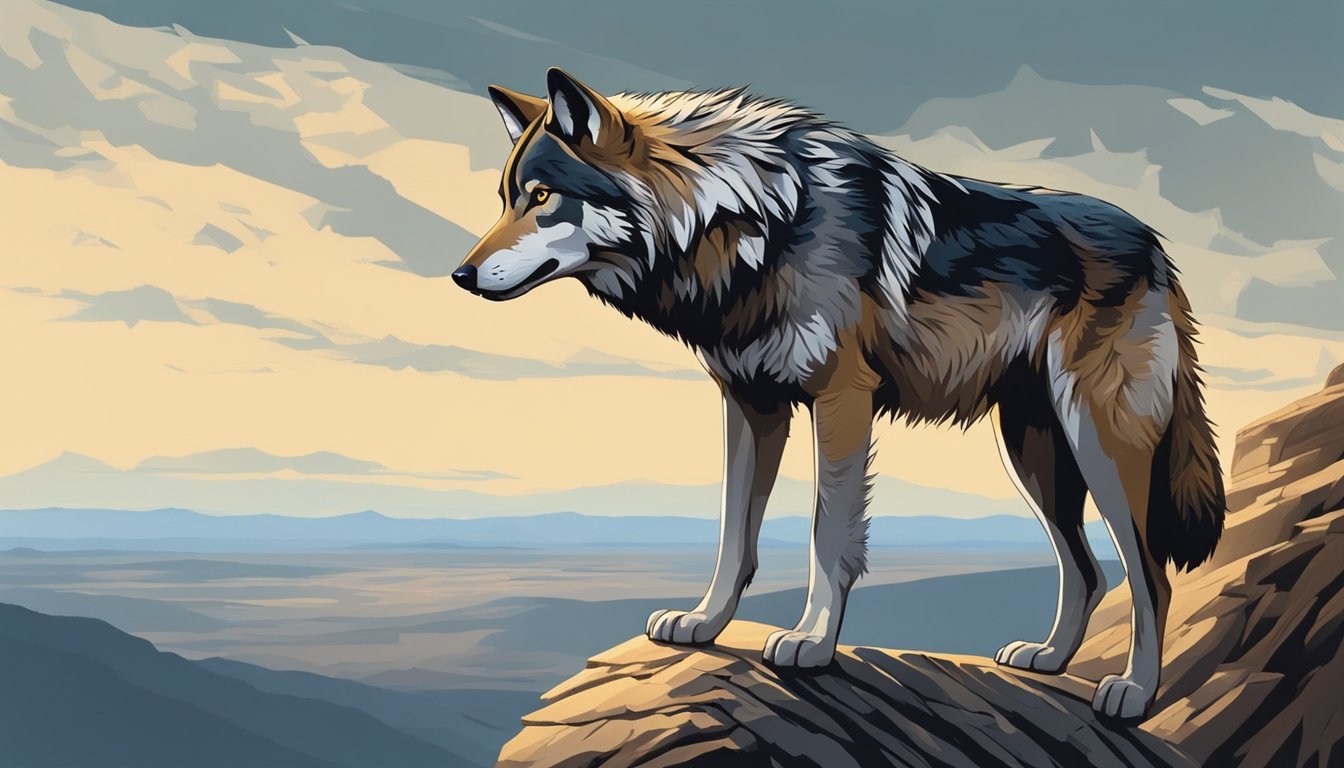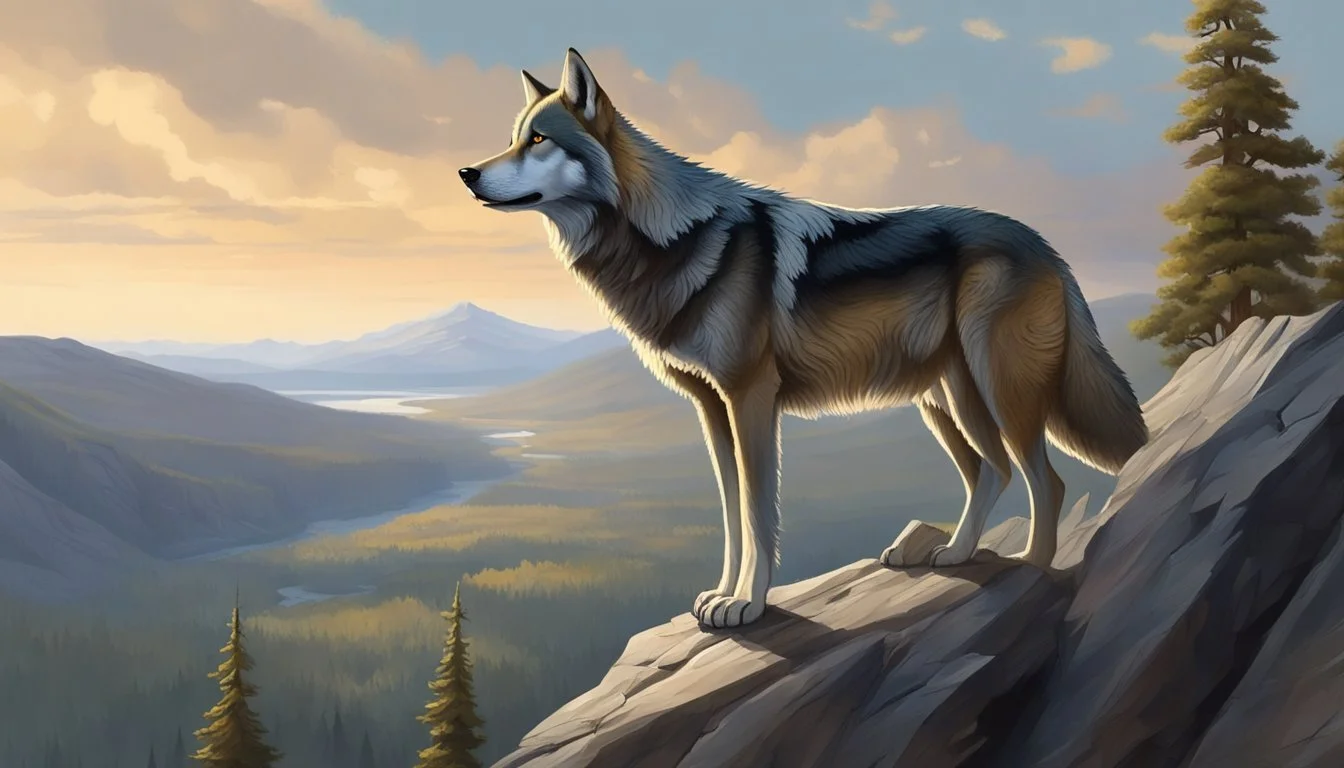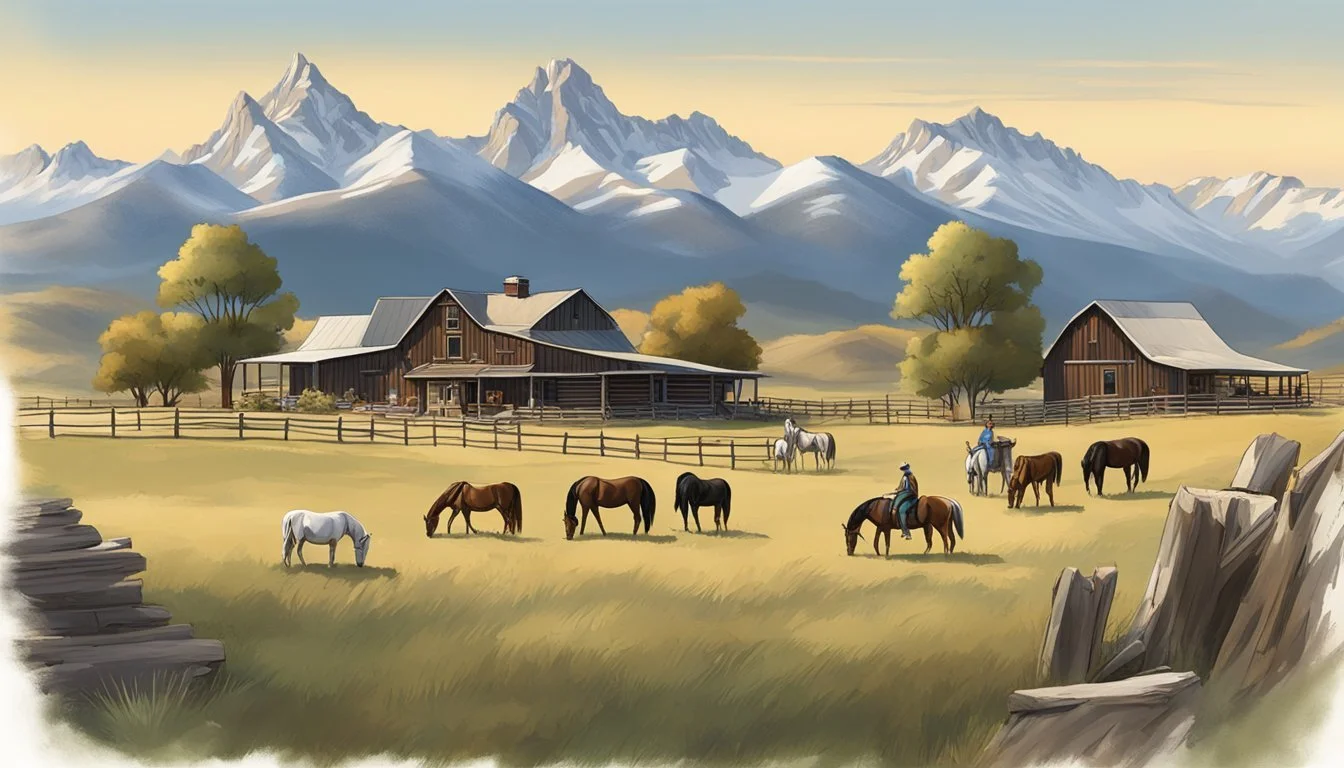Family Loyalty vs. Individual Ambition in Yellowstone
The Dutton Dilemma
Yellowstone, Taylor Sheridan's gripping TV series, explores the complex dynamics of the Dutton family as they fight to maintain control of their vast Montana ranch. At its core, the show examines the tension between family loyalty and individual ambition, a theme that resonates throughout the narrative.
The Dutton family, led by patriarch John Dutton (Kevin Costner), must constantly choose between their personal desires and the preservation of their family legacy. This conflict is exemplified in the relationships between siblings, particularly Beth and Jamie Dutton, whose fierce rivalry stems from a combination of betrayal and competing aspirations.
As the series progresses, viewers witness the characters grapple with difficult decisions that pit their individual goals against the collective interests of the Dutton clan. This struggle for balance between personal ambition and family loyalty drives much of the drama and character development in Yellowstone, creating a compelling narrative that keeps audiences engaged.
Exploring the Central Themes
Yellowstone masterfully explores the complex interplay between family loyalty, individual ambition, and the struggle to maintain power and legacy. These themes form the core of the series' narrative, driving character development and plot progression.
Tension Between Loyalty and Ambition
The Dutton family grapples with conflicting desires for personal success and familial obligation. John Dutton's children face difficult choices between pursuing their own dreams and upholding the family legacy. Beth's fierce dedication to her father's empire often clashes with her own aspirations. Jamie's political ambitions create friction with his family's expectations.
This tension manifests in key story arcs, like Jamie's adoption revelation and subsequent actions against the family. The series explores how characters navigate these competing forces, sometimes choosing loyalty at great personal cost, while others prioritize individual goals.
Depiction of Family and Power Dynamics
Yellowstone portrays the Dutton family's complex relationships and power struggles. John Dutton's iron grip on the ranch and his children's lives creates both strength and conflict. Sibling rivalries and alliances shift as characters jockey for position within the family hierarchy.
The show examines how power is wielded within the family:
John's manipulation of his children
Beth's ruthless tactics to protect the ranch
Kayce's struggle between his duties as a son and his own family's needs
These dynamics extend beyond the Duttons, influencing their interactions with allies, enemies, and the broader community.
Land Ownership and Legacy
The Yellowstone Ranch serves as a symbol of the Dutton family's legacy and power. The struggle to maintain control of this vast empire drives much of the series' conflict. John Dutton's obsession with preserving his land for future generations shapes his decisions and relationships.
The show explores:
Historical context of land ownership in the American West
Modern threats to ranching traditions
Environmental and economic pressures on large landholders
This theme ties into broader questions about heritage, stewardship, and the changing face of rural America. Characters must weigh the value of tradition against the realities of progress and change.
Character Analysis and Development
Yellowstone's characters are complex individuals grappling with conflicting loyalties and personal ambitions. Their development throughout the series reveals deep-seated motivations and evolving relationships that drive the show's central conflicts.
John Dutton's Leadership and Vision
John Dutton, portrayed by Kevin Costner, stands as the patriarch of the Dutton family and owner of the largest contiguous ranch in the United States. His leadership style blends unwavering determination with calculated ruthlessness.
John's vision for preserving his family's legacy often puts him at odds with modern progress and outside interests. This conflict shapes his decisions and relationships throughout the series.
His character evolves as he faces threats to his land and family, revealing moments of vulnerability beneath his tough exterior. John's complex nature is evident in his fierce protection of the Yellowstone and his sometimes strained connections with his children.
Beth Dutton's Complexities and Influence
Beth Dutton, played by Kelly Reilly, emerges as one of Yellowstone's most dynamic characters. Her sharp wit and ruthless business acumen make her a formidable force within the family and beyond.
Beth's loyalty to her father is unshakeable, often leading her to take extreme measures to protect the ranch. Her character development reveals layers of trauma and vulnerability beneath her hardened exterior.
Her influence extends beyond family matters, as she navigates corporate dealings and personal vendettas with equal intensity. Beth's relationships, particularly with Rip Wheeler, showcase her capacity for deep emotional connections despite her often abrasive demeanor.
Kayce Dutton's Internal Struggle
Kayce Dutton, portrayed by Luke Grimes, embodies the internal conflict between family duty and personal desire. His character arc explores the tension between his responsibilities to the Dutton ranch and his commitment to his own family.
As a former Navy SEAL, Kayce brings a unique skill set to the family's conflicts. His development throughout the series highlights his struggle to balance his father's expectations with his own moral compass.
Kayce's journey involves reconciling his Native American heritage through his wife Monica with his role in the Dutton empire. This internal tug-of-war shapes his decisions and relationships, adding depth to his character.
Rip Wheeler and the Notion of Redemption
Rip Wheeler, played by Cole Hauser, exemplifies loyalty and the potential for redemption. His unwavering dedication to the Dutton family, particularly to John and Beth, defines his character throughout the series.
Rip's backstory reveals a troubled past, which John Dutton helped him overcome. This redemption arc continues as Rip proves himself indispensable to the ranch's operations and the family's protection.
His relationship with Beth adds another layer to his character, showing his capacity for love and vulnerability. Rip's development demonstrates how loyalty and second chances can transform a person, making him a fan favorite in the Yellowstone universe.
Cultural and Societal Impact
Yellowstone has left an indelible mark on American popular culture, sparking conversations about land ownership, family dynamics, and the modern West. The show's impact extends beyond entertainment, influencing perceptions of rural life and indigenous communities.
Yellowstone as a Cultural Phenomenon
Yellowstone Ranch has become a symbol of the American West in contemporary media. The show's popularity has led to increased tourism in Montana, with fans seeking to experience the rugged landscapes depicted on screen. Local businesses have capitalized on this trend, offering Yellowstone-themed tours and merchandise.
The series has also reignited interest in Western fashion. Cowboy hats, boots, and denim have seen a resurgence in popularity, with many retailers reporting increased sales of Western-inspired clothing.
Yellowstone's portrayal of ranch life has sparked debates about land conservation and the challenges faced by modern ranchers. These discussions have brought rural issues to the forefront of national dialogue.
Representation of Native American Tribes
Yellowstone's depiction of Native American characters and storylines has drawn both praise and criticism. The show features prominent indigenous actors and explores conflicts between tribal interests and those of the Dutton family.
Some viewers appreciate the series' effort to include Native American perspectives, highlighting issues such as land rights and cultural preservation. Critics, however, argue that certain portrayals reinforce stereotypes or oversimplify complex tribal dynamics.
The show has prompted discussions about accurate representation of indigenous people in media. It has also raised awareness about the ongoing challenges faced by Native American communities in Montana and beyond.
Influence on Modern Western Genre
Yellowstone has revitalized the Western genre for television audiences. Its success has paved the way for other contemporary Western series and films, inspiring a new wave of storytelling set in the American West.
The show blends traditional Western elements with modern themes, creating a unique subgenre often referred to as the "neo-Western." This approach has attracted viewers who might not typically engage with classic Westerns.
Yellowstone's storytelling style, characterized by complex characters and morally ambiguous situations, has influenced other productions in the genre. Its exploration of power dynamics and family conflicts has become a template for modern Western narratives.
Plot Dynamics and Storytelling Techniques
The Yellowstone series masterfully weaves intricate plot dynamics and compelling storytelling techniques to create a gripping narrative. Character conflicts, power struggles, and unexpected twists keep viewers on the edge of their seats.
Power Struggles and Confrontations
At the heart of Yellowstone lies a constant battle for control. The Dutton family faces threats from various adversaries, including corporations, government entities, and rival ranchers. These power struggles manifest in tense boardroom negotiations, courtroom dramas, and violent confrontations on the ranch.
John Dutton's unwavering determination to protect his land leads to strategic alliances and ruthless decision-making. His children, each vying for their father's approval, engage in their own power plays within the family structure.
The show excels at portraying the complexities of these conflicts, often blurring the lines between right and wrong. This moral ambiguity adds depth to the characters and their motivations.
Themes of Betrayal and Revenge
Betrayal and revenge drive many of Yellowstone's most compelling storylines. Trust is a rare commodity in the Dutton world, with allies often becoming enemies and vice versa.
Family members betray one another for personal gain or to protect their own interests. Business deals turn sour, leading to elaborate schemes for retribution. The writers skillfully craft these betrayals to shock and engage the audience.
Revenge plots unfold over multiple episodes or even seasons, creating a sense of anticipation and dread. Characters' past actions come back to haunt them, often with devastating consequences.
Cliffhangers and Series Progression
Yellowstone's writers excel at crafting nail-biting cliffhangers that leave viewers eager for more. Season finales often feature life-or-death situations, shocking revelations, or major power shifts.
These cliffhangers serve multiple purposes:
Maintaining audience engagement between seasons
Setting up new conflicts and storylines
Raising the stakes for characters and their relationships
The series progression builds on these cliffhangers, with each season raising the stakes higher than the last. New characters are introduced, alliances shift, and the Dutton family faces increasingly formidable challenges.
This storytelling technique creates a sense of momentum and urgency that keeps viewers invested in the long-term arc of the series.
The Dutton Family Legacy
The Dutton family's legacy is deeply intertwined with the Yellowstone Ranch. Their story is one of fierce loyalty, strategic maneuvering, and constant threats to their way of life.
Strategic Decisions and Family Drama
John Dutton, the family patriarch, leads with unwavering determination. His decisions shape the ranch's future and often spark intense family conflicts. Beth, his daughter, demonstrates fierce dedication to preserving their legacy, even confronting her brother Jamie violently.
Jamie's past betrayals against John highlight the complex dynamics at play. These internal struggles test the family's bonds and influence their strategic choices for the ranch's survival.
The Duttons face difficult decisions about land use and development. Their choices often pit family members against each other, creating a tense atmosphere rife with drama and power plays.
Loyalty in the Face of External Threats
External pressures constantly challenge the Duttons' hold on their land. Land developers, rival ranchers, and political opponents all seek to claim pieces of the Yellowstone Ranch.
The family's loyalty is tested as they unite against these threats. John relies on trusted allies like Rip Wheeler, whose violent past and unwavering devotion prove invaluable in protecting the ranch.
Kayce Dutton struggles to balance his family obligations with his desire for a quieter life. This internal conflict reflects the broader theme of personal sacrifice for the sake of the family's legacy.
Speculation on the Future of the Yellowstone Ranch
The fate of the Yellowstone Ranch remains uncertain. Some speculate that increasing pressures may force the Duttons to consider selling parts of their land.
Others believe the family's resilience will prevail, allowing them to maintain their vast holdings. The potential for new alliances or unforeseen challenges adds to the uncertainty.
The next generation of Duttons, including Kayce's son Tate, may play a crucial role in determining the ranch's future. Their choices could either preserve or fundamentally alter the family's legacy on the land.
Comparative Analysis with Other Series
Yellowstone shares thematic elements with classic TV dramas while reinventing familiar character archetypes. The series draws parallels to iconic shows like Dallas and Dynasty, yet carves its own niche in the modern television landscape.
Yellowstone vs. Dallas and Dynasty
Yellowstone echoes the family-centric power struggles of Dallas and Dynasty. All three series revolve around wealthy families fighting to maintain control of their empires. Dallas' Ewing family and Dynasty's Carringtons mirror the Duttons in their quest for dominance.
The shows differ in setting and tone. Dallas and Dynasty focus on oil tycoons in urban environments, while Yellowstone explores ranching in rural Montana. Yellowstone's rugged backdrop adds a layer of authenticity to its conflicts.
Family dynamics play a crucial role in each series. Sibling rivalries, parental expectations, and generational clashes drive the narratives forward. Yellowstone, however, delves deeper into the moral complexities of preserving a family legacy in a changing world.
Archetypes of Antiheroes and Prodigal Sons
Yellowstone reimagines classic character archetypes for a contemporary audience. John Dutton embodies the antihero archetype, reminiscent of J.R. Ewing from Dallas. Both characters blur the lines between right and wrong in pursuit of their goals.
The prodigal son trope features prominently in Yellowstone through Jamie Dutton. His journey parallels characters like Steven Carrington from Dynasty, grappling with family expectations and personal ambitions.
Yellowstone's characters exhibit more moral ambiguity than their predecessors. The show explores the psychological toll of upholding a family legacy, creating complex, flawed individuals rather than clear-cut heroes and villains.
Female characters in Yellowstone, particularly Beth Dutton, subvert traditional roles seen in earlier series. They wield significant power and influence, often rivaling or surpassing their male counterparts in cunning and determination.
Impact on Real World Issues
Yellowstone's portrayal of conflicts over land and power resonates deeply with real-world issues facing the American West. The show highlights tensions between traditional ways of life and modern economic pressures.
Land Rights and Indigenous Claims
The series brings attention to complex land disputes in the region. Native American tribes fight to reclaim ancestral territories, mirroring real legal battles over treaty rights. The fictional Broken Rock Reservation's struggles reflect actual challenges faced by indigenous communities.
Land ownership conflicts pit ranchers against developers and government agencies. This echoes ongoing debates about public land use, conservation, and economic development in Western states. The show depicts how historical injustices continue to shape present-day conflicts over resources and sovereignty.
Ranching Industry and Corporate Influence
Yellowstone showcases the economic pressures threatening traditional ranching. Large corporations seek to acquire land for tourism and resource extraction, mirroring real trends in the industry. The Dutton family's efforts to maintain their way of life highlight the challenges faced by multi-generational ranching operations.
Corporate interests wield significant influence through political connections and financial power. This reflects concerns about the outsized impact of money in local and state politics. The show's portrayal of backroom deals and corrupted officials resonates with real-world debates about campaign finance and lobbying.
Viewers' Engagement and Fandom
Yellowstone's compelling narrative and complex characters have fostered a passionate fanbase. Viewers connect deeply with the show's themes and engage in lively discussions about its twists and turns.
Emotional Resonance and Relatability
The Dutton family's struggles resonate strongly with audiences. Many viewers see reflections of their own familial bonds in the characters' relationships. The show's exploration of loyalty, betrayal, and sacrifice within a family unit strikes a chord with fans.
The rugged Montana landscape serves as more than a backdrop. It becomes a character in its own right, evoking a sense of nostalgia and connection to the American West. This setting enhances the emotional impact of the story.
Fans often share personal stories online, relating their experiences to those of the Duttons. This emotional investment fuels continued engagement with the series.
Fan Theories and Speculations
Yellowstone's intricate plotlines inspire vibrant fan speculation. Online forums and social media buzz with theories about character motivations and future story arcs.
Viewers analyze every detail, from subtle dialogue cues to background elements. They craft elaborate predictions about the fate of the Dutton ranch and the family's legacy.
Fan engagement extends to character rankings and relationship predictions. Debates about potential alliances and betrayals keep the fandom active between episodes.
This speculation culture has led to fan-created content, including artwork and fan fiction. These creative expressions further strengthen the community around the show.








